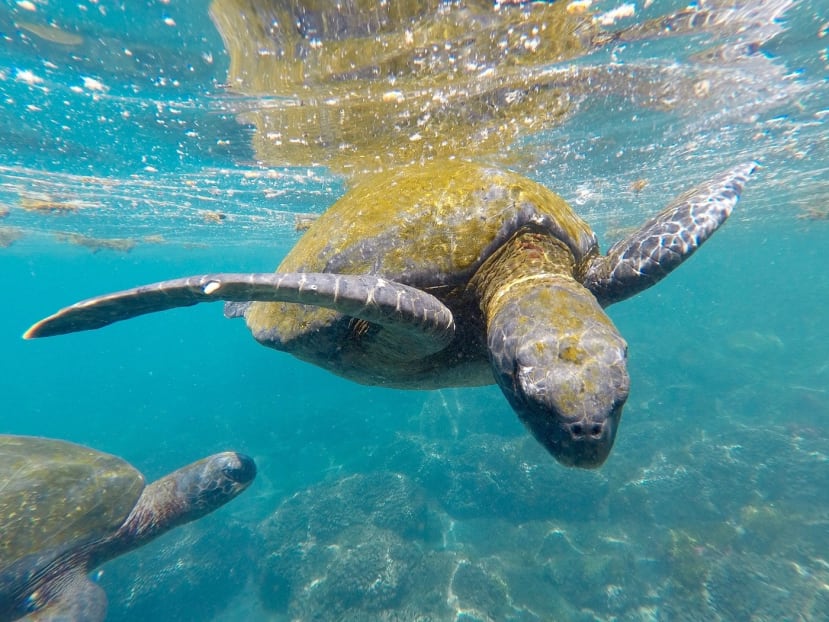SOURIAU Waterproof connectors - Which one for my application?
Follow articleHow do you feel about this article? Help us to provide better content for you.
Thank you! Your feedback has been received.
There was a problem submitting your feedback, please try again later.
What do you think of this article?

Waterproof connectors are a very broad and diverse range of products, and they are designed to meet an equally broad range of applications and environments.
In order to choose the right one for your application, it is important to understand what features will be required to ensure a safe connection, at an optimal cost.
The role of a connector, when mated, is to transfer electrical current between two cables, or a cable and a device. Elementary physics teaches us that electricity and water do not work well together, and this poses a number of challenges when it comes to using electrical equipment around water. However, with the exponential increase of electric and electronic equipment in our daily lives, it is no surprise to see the number of applications requiring waterproof electrical connectors taking off, and their engineering requirements range from simple to highly complex.
Applications requiring waterproof connectors
Weatherproof
Outdoor lighting is a great example of applications that require waterproof connectors in order to avoid damage to the equipment and connector from dust, rain or snow. In this case, we would refer to the requirements as weatherproof. Weatherproof connectors are typically sealed on the receptacle side since the receptacle is mounted on the equipment. The IP rating (Ingress Protection) should be at least IP65 to prevent the penetration of dust and water, at least sufficiently to ensure the safe operation of the equipment. Anything above IP65 will also be suitable, but in terms of optimising your costs, you might want to ensure that you are not over-specifying, especially since higher performance connectors can cost more.
Of course, lighting is an example but any outdoors equipment that may be exposed to harsh weather conditions will benefit from this level of protection. Other examples include stage equipment, security cameras, and traffic management equipment. Since these are outdoor applications, resistance to UVs might also be required, because exposure to sunlight can alter the colour and sometimes mechanical properties of certain materials.
Outdoor equipment
- Minimum recommended sealing rating: IP65
- Other requirements: UV resistance, corrosion resistance
SOURIAU solution: Trim Trio connectors
Medical
Medical environments are quite specific as equipment may be subjected to unique conditions. In order to minimise risks of contamination and the spread of bacteria or viruses, medical equipment needs to be cleaned and sterilised on a regular basis.
A common sterilisation technique found in medical facilities and laboratories is the use of Autoclaves, which are chambers that sterilise using steam at 134°C during 3 minutes (or alternatively 121°C during 15-20 minutes). When placed into the Autoclave for sterilisation, the equipment must be taken apart and laid out to allow the steam to reach every corner and surface. This means that to ensure optimal safety, medical equipment, connectors included if fitted, should be able to withstand such damp heat conditions. Therefore, if you are looking for connectors that can maintain their performance, you will want to identify products that are not sensitive to thermal expansion and water absorption, since certain types of materials including various plastics can change properties and even melt at temperatures lower than 134°C. Considering these high requirements for water ingress protection, it would be recommended to have connectors with an IP rating of at least IP68 in mated and unmated condition because they will need to be unmated during the sterilisation process.
Other requirements for medical equipment will most likely include the manufacturer's compliance with ISO13485, with the United States' Food & Drug Administration (FDA) and CE approval for the European Union.
Medical equipment
- Minimum sealing rating: IP68
- Other requirements: withstand sterilisation, biocompatible, FDA/CE approved
SOURIAU solution: JMX series connectors
Shallow Sea Water Immersion
Photo credit: Photo by Magdalena Kula Manchee on Unsplash
Shallow immersion in seas and oceans is an area that is gaining traction with the development of marine monitoring devices and unmanned surface vehicles. With the development of drone technology, unmanned watercraft are offering possibilities that are much more efficient than buoys (stationary or drifting), and far less expensive than vessels, ideal for research and monitoring, not to mention military applications. This is leading to an increasing demand for connectors that can be immersed in seawater for extended periods or even permanently, without affecting their electrical and mechanical performance.
Saline environments are aggressive and accelerate the corrosion of metal because electrons move more easily in salt water compared to fresh water. For metal connectors, this is without a doubt a challenge to ensure long-term performance, and any usual metal element exposed to seawater for long periods will require surface treatment beforehand, or engineering solutions to maintain its properties.
Connectors made from certain types of plastic will offer a solution to the oxidisation of metal shells, and nowadays certain types of (expensive) thermoplastics offer mechanical performance characteristics close to aluminium and steel. These materials will ensure a long-life waterproof housing for the connector and protect the contacts inside, which are usually made from a copper alloy, plated with nickel and sometimes gold, from reacting with the seawater.
For these types of applications, we would no longer refer to IP ratings to determine the level of sealing because they are by default perfectly waterproof. However, connectors immersed in water will be subject to increasing pressure according to the immersion depth. This pressure can have a significant impact on the connector's performance due to the crushing effect as the connector dives deeper.
For shallow water immersion, we can consider the equipment will operate to a maximum depth of 300 meters (1000 feet). At this level, connectors need to be able to withstand 30 bars of pressure, equivalent to 430 PSI (pounds per square inch). Ideally, you will need a connector capable of withstanding this amount of pressure mated and unmated.
Depending on the specific application, you may want to carefully check other features and technical specifications of the connector. Operating temperature range may be of interest if the conditions will be very cold (the warmest sea temperatures should be easily manageable). Weight is usually an important factor as well for all types of vehicles considering that the heavier they are, the more energy they require for propulsion.
Shallow Water Immersion
- Minimum pressure rating: 30 bars (430 PSI)
- Other requirements: corrosion resistance, temperature range, weight
SOURIAU solution: SWIM series connectors
Deep Seawater Immersion
Connectors for deep sea water immersion have been researched and developed for decades already, although modern technologies are providing increasingly high-performance products. They play a critical role in fields such as submarines and military marine, commercial marine, oil and gas exploration and marine renewable energy.
Immersion in seawater regardless of the depth presents similar challenges as those described above, with a highly corrosive environment for metal and the need to be totally watertight. Deep immersion, however, will change the environment significantly in terms of pressure, with most plastics being unable to withstand such force. One common practice is to use nickel aluminium bronze for the outer shell. This alloy is extremely robust and resistant to corrosion, and so suits perfectly the conditions for deep immersion in salt water.
The pressure in deep immersion connectors would most likely require a resistance to 200 or 300 bars, but certain options can have been tested and qualified @ 1000 bars, equivalent to 10 000 meters under water, which is close to the deepest known points in our oceans .
Deep Water Immersion
- Minimum pressure rating: 200 bars (2000 meters)
- Other requirements: corrosion resistance, temperature range
SOURIAU solution: M series connectors
IP Rating (Ingress Protection)
|
First digit (solid) |
Effective against |
Second digit (liquid) |
Effective against |
|
X |
Not available |
- |
|
|
0 |
No protection against contact and ingress of solid material |
0 |
None |
|
1 |
>50mm - Large surface of body, such as hand |
1 |
Dripping water when item is upright will have no harmful effect |
|
2 |
>12.5mm - Fingers or similar |
2 |
Dripping water when item is tilted 15° will have no harmful effect |
|
3 |
>2.5mm - Tools or thick wire |
3 |
Water falling as spray up to 60° will have no harmful effect |
|
4 |
>1mm - thin wire, screws, blades |
4 |
Water splashing from any angle will have no harmful effect |
|
5 |
Dust protected - Ingress is not totally prevented but enough to protect internal mechanism |
5 |
Water jet (6.3mm) from any enclosure will have no harmful effect |
|
6 |
Dust tight - Completely impermeable to dust, even when vacuum applied |
6 |
Water projected more powerfully (100kPa) from any angle will have no harmful effect |
|
|
|
6K |
Water projected more powerfully (1000kPa) from any angle will have no harmful effect |
|
|
|
7 |
Not enough water ingress to affect functioning even when submerged up to 1m |
|
|
|
8 |
Suitable for continuous water immersion, generally up to 3m |
|
|
|
9K |
Protected against close-range, high pressure (8-10MPa) & temperature (80°C) water jets |



